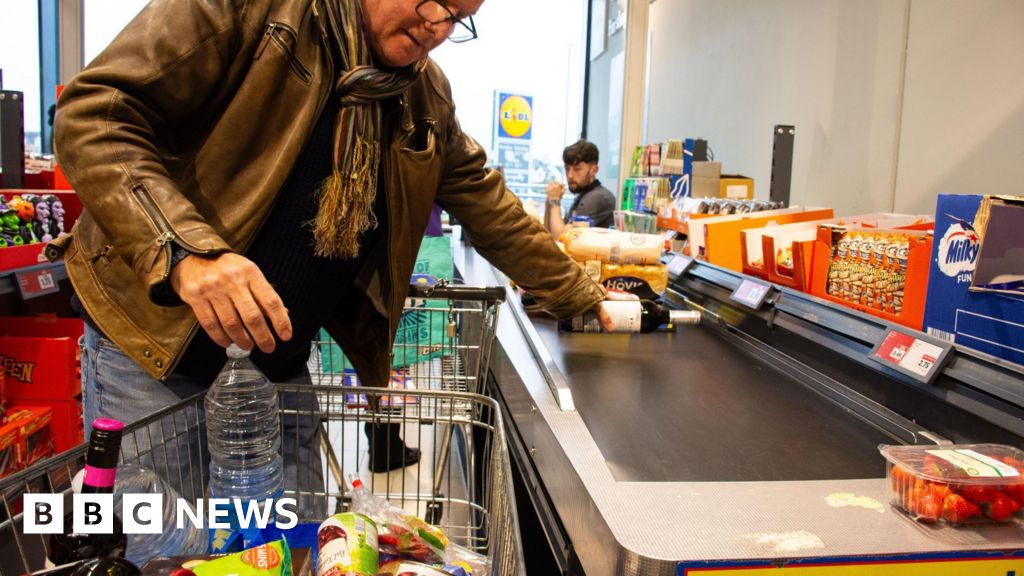Men are buying more from Lidl’s middle aisle, its UK boss has said as the supermarket returned to profit after a loss-making year.
Ryan McDonnell said the middle of Lidl, known for its unusual stock which ranges from power tools to inflatables, had a “big male following”.
“We often get partners at odds with each other because men have disappeared up the aisle and are buying things they maybe already have,” he told the BBC.
His comments came as Lidl reported a pre-tax profit of £43m, compared with a loss of £76m the previous year.
It saw a 16.9% jump in annual sales for the year to the end of February 2024 with sales of nearly £11bn.
It’s 30 years this month since Lidl arrived in the UK. It now has more than 960 shops and is the nation’s sixth biggest grocer.
Mr McDonnell has been with the firm for most of it and remembers the early no frills stores packed with unfamiliar products.
“I remember selling pallets of more continental products. We’ve come a long way, evolving our ranges,” he said.
One of its quirks is “the middle of Lidl” and a trip to the retailer has become synonymous with shoppers returning with something they had not gone in for.
Two-man canoes and flamethrowers
“There are some interesting shopping habits in this aisle,” he said, adding he had known rows between couples after a man had become “intrigued by a gadget or two”.
“I would say there are a lot of men in trouble when they come in here,” he said.
There are Facebook pages, Reddit threads and YouTube videos dedicated to middle-aisle finds.
“My mum came back with a two-man canoe despite not living near any suitable body of water,” one Reddit user posted on a thread about things people had found. “A flamethrower,” another user posted. “It was for getting rid of weeds.”
Aside from the middle aisle, Mr McDonnell said there had been a lot of early spend on mince pies, party food and panettone. He said Lidl had won a lot of new customers and many were in a “confident mood” for Christmas despite the tough economic backdrop.
Lidl has been freshening up the look of its stores, putting bakeries at the entrances and displaying more fruit and veg. Both categories have seen a jump in sales.
Amid cutthroat competition and price matching, Mr McDonnell believes the shopping experience is just as important as the price to keep pulling customers in.
Lidl is the fastest-growing supermarket chain in the UK this year but, like other retailers, it is now having to deal with the impact of the Budget. Supermarkets employ large numbers of people and profit margins are slim.
Mr McDonnell warned tax rises announced in the Budget would add tens of millions of pounds to its costs in the coming year.
The bosses of Sainsbury’s and Marks & Spencer have both warned shoppers could face higher prices as a result of an increase in employer National Insurance Contributions (NICs).
On Tuesday, Lidl joined dozens of High Street giants in signing a letter to the Treasury warning job losses were “inevitable” and price rises “a certainty” as a result of measures announced in the Budget and other rising costs.
The Treasury told the BBC the government “had to make difficult choices to fix the foundations of the country”.
Mr McDonnell declined to put an exact figure on the extra cost of NICs, but said it was just one of a number of new costs coming down the track creating a cumulative burden for the industry.
“We’re talking about National Insurance, National Living Wage, we’re talking about business rates. We have packaging and recycling taxes coming in. That’s a lot of pressure on business all at once,” he said.
“I think the government needs to review how they intend to inspire growth.”
However, he insisted Lidl’s investment plans in the UK would not change, with 18 more stores due to open in the next few months followed by 40 in the next financial year.
